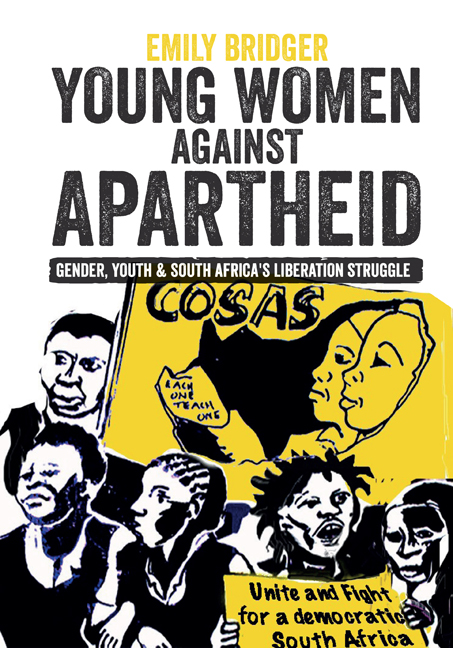Book contents
- Frontmatter
- Dedication
- Contents
- Acknowledgements
- List of Acronyms and Abbreviations
- Glossary
- Map of Soweto
- Introduction
- 1 African Girlhood under the Apartheid State
- 2 The School: Becoming a Female Comrade
- 3 The Home: Negotiating Family, Girlhood, and Politics
- 4 The Meeting: Contesting Gender and Creating a Movement
- 5 The Street: Gendering Collective Action and Political Violence
- 6 The Prison Cell: Gender, Trauma, and Resistance
- 7 The Interview: Reflecting on the Struggle
- Conclusion
- Bibliography
- Index
- Related James Currey titles on South & Southern Africa
- Frontmatter
- Dedication
- Contents
- Acknowledgements
- List of Acronyms and Abbreviations
- Glossary
- Map of Soweto
- Introduction
- 1 African Girlhood under the Apartheid State
- 2 The School: Becoming a Female Comrade
- 3 The Home: Negotiating Family, Girlhood, and Politics
- 4 The Meeting: Contesting Gender and Creating a Movement
- 5 The Street: Gendering Collective Action and Political Violence
- 6 The Prison Cell: Gender, Trauma, and Resistance
- 7 The Interview: Reflecting on the Struggle
- Conclusion
- Bibliography
- Index
- Related James Currey titles on South & Southern Africa
Summary
Vicky was seventeen years old when, in 1983, police came knocking on the door of her family home in Diepkloof, Soweto – a township located fifteen kilometres from central Johannesburg. It was the middle of the night and Vicky's family – her mother, two sisters and three brothers – were all asleep in their small two-bedroom house. Vicky lay beside her sisters. Her hair, which she wore in short tight curls during the day, had been neatly plaited into braids by her mother before bed. The police burst into the house searching for Vicky, shouting for the lang en skraal meisei met krullerige hare (the tall and slim girl with curly hair), as she had been described to them by a local informer. But in her night-time braids Vicky was indistinguishable to the police from her sisters. The officers returned to their van and brought in the youth who had informed them that Vicky was involved in anti-apartheid student politics in the area, demanding that he point her out to them. With the correct sister in their grasp, the police took Vicky, along with six young men they had also rounded up that night, to Moroka Police Station.
At the time of Vicky's arrest, South Africa was still in the midst of apartheid. Yet after two decades of heavy suppression, the country's anti-apartheid activists were beginning to feel a faint sense of hope. New resistance organisations were forming, township communities were organising against local grievances, and the apartheid government was beginning to implement a number of concessions and reforms. In the same year as Vicky's encounter with the police, activists came together to form the United Democratic Front (UDF), which helped to inspire a new period of mass insurrectionary politics. By the end of 1984, many South African townships were engaged in uprisings against the state and its local allies. This year marked the beginning of an unprecedented period of protest and political violence, as burgeoning activism was met by the state's increased militarisation and use of coercive tactics against township residents.
During these township uprisings, which lasted in various forms until the country's formal transition to non-racial democracy in 1994, it was often African children, students, and youths who became the vanguards and shocktroops of the anti-apartheid struggle.
- Type
- Chapter
- Information
- Young Women against ApartheidGender, Youth and South Africa's Liberation Struggle, pp. 1 - 24Publisher: Boydell & BrewerPrint publication year: 2021

